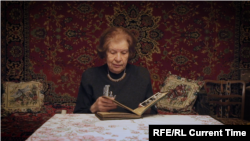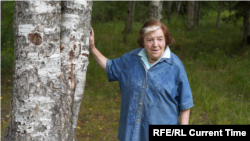Even as the Russian government, mainstream media, and educational institutions now seek to promote the Soviet Union, there are those who still remember the excesses of Soviet authoritarianism. In the documentary series Generation Gulag, the award-winning, media outlet Coda Story, a Current Time partner, speaks with 12 labor-camp victims, who share how Soviet-era repressions affected their families and society at large.
Current Time’s Denis Shekhanin spoke with Generation Gulag producer Katerina Patin about why the Soviet gulag remains a timely topic today.
Katerina, what was the main reason that you launched the project about the gulag?
There’s a limited window of time we have to hear firsthand from gulag survivors. These eyewitnesses to Soviet authoritarianism know some of the darkest chapters of Soviet history, and as Russia and other nations around the world see the rise of a new generation of authoritarian leaders, Gulag survivors have important messages for our generation. Many gulag survivors are in their 80s and 90s, but that doesn’t mean they aren’t sharp observers of our time, interested in not only re-telling their stories, but in drawing powerful comparisons to the present. No country is immune to instrumentalizing its history, and, as a newsroom, we’re tracking how distorting the past is serving regimes around the world as part of Coda’s disinformation coverage.
How did you find your characters?
Coda worked with a team of producers in Russia and Latvia who found characters through Moscow’s Gulag History Museum, Memorial (a non-governmental civil-rights organization that highlights the abuses of Russia’s Soviet past -- ed), and other local organizations.
Could you tell me more about them? Who are they?
The people in our series all have different stories from across the gulag experience, which includes the arrests, interrogations, imprisonment, executions, deportations, and exile. We made a point of speaking to individuals from different time periods because it’s important to understand the gulag not as just one dark chapter in Soviet history, but as a fundamental part of the USSR’s economic planning and system of control that existed from as early as 1918 to 1987.
Was it hard for them to speak about their painful past? Did they resist?
Some of the gulag survivors we spoke to were sharing their story for the first time after years of silence. For many of our speakers, retelling their gulag story meant reliving it. Some found it difficult to recount this history.
We were honored to have a chance to record these stories before they slip away, and I believe the survivors Coda spoke to understood why their stories are relevant and important today.
How do you think attitudes toward the Soviet past have changed in Russian politics during the last several years?
It’s incredible to think that not a single person was ever held responsible for running the gulag. In school textbooks, the Soviet Union’s massive system of forced labor camps is treated as a footnote, while Vladimir Putin amends public education laws to include instruction on patriotism and war history.
The closure of one of the only museums located at a former gulag camp is especially telling: Perm-36 was a gulag museum with a powerful exhibition on camp life visited by vast groups of Russians and tourists from abroad. But in 2015, the private museum was branded a “foreign agent” and then taken over by the local government, who re-cast the exhibition to focus on prisoners’ contribution to timber production in the World War II war effort.
Disinformation surrounding the history of the gulag isn’t so much a campaign of outright lies, but a muting and deemphasizing of one of the most important chapters of history to the point where these memories and stories offer no special meaning or lessons for the present.
Did you speak with your characters about the political situation in Russia now?
It was important for us that Generation Gulag not be a series of films about the past, but about a story happening now. Gulag survivor Galina Nelidova was one of the most outspoken voices about Russia’s current political situation. She was emotional when describing her disgust at watching the legacy of the Soviet Union rehabilitated today on Russian state television: “I find it shameful that people still don’t know the whole truth,” she told us. “Even when I hear [Communist Party leader Gennady] Zyuganov saying, ‘What can you do? A few thousand people were arrested back then.’ But we know that it was millions.” She goes on to say that “There’s a lot I don’t like. Even with glasnost and everything it seems that today people are sometimes still prosecuted and sent away for nothing. I don’t like it.”
I understand that you've heard a lot of dreadful stories, making your films. But could you tell me what affected you the most?
It’s very difficult to pick one -- especially as each story is completely unique -- but if I had to do so, it would be the first person we interviewed, Irina Verblovskaya in St. Petersburg. As a gulag survivor and a historian, she was able to both tell her own incredible story and step back to see how it fits into the broader historical narrative.
“Unfortunately, our historical experience from the earliest days has been very harsh,” she told us. “Human individuality isn’t valued here. Human life isn’t valued here. We’re counted in numbers and in masses and not as individuals.”
Irina lived through such an unforgiving period of history, but in her memory she’s also preserved some of the smallest, most gentle details: the way she felt when her husband looked at her; how she searched for the moon from her prison window; the colors of the Siberian taiga in the summer.
Could you tell more about Coda’s projects? What are your main goals?
Coda Story sticks with one crisis at a time, providing unique depth, continuity and understanding of the events shaping our world. Our team is now reporting on disinformation, authoritarian technology, and the war on science; connecting stories from around the world and exploring how they shape our lives.
We make a point not to chase breaking news but, instead, to track trends and follow up on stories that have slipped from headlines even though they are developing and important. We work to tell you stories you have never heard before and show you connections between them you never knew existed. Our Generation Gulag series is part of our newsroom’s coverage of rewriting-history stories from around the world, where we are tracking how distorting the past is serving regimes today.
Do you think the gulag remains a topical subject in 2020?
Absolutely. There’s strong evidence that the campaign to rewrite Soviet history is succeeding today: close to half of young Russians say they have never heard of the Stalin-era purges and Stalin himself has never been more popular.
In 2019, 70 percent of Russians responded that they approve of Stalin’s role in history — a record high. President Vladimir Putin has even warned against the “excessive demonization” of Stalin. As the gulag generation becomes smaller and smaller, there will be fewer voices to tell the true story of the Soviet Union’s system of terror, which defined people’s lives for decades.
Generation Gulag may be viewed on Current Time’s YouTube channel for documentary films. For additional details, please visit Coda Story’s website (Russian version) or YouTube account.







